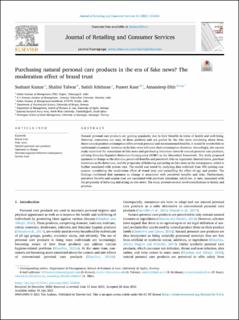Purchasing natural personal care products in the era of fake news? The moderation effect of brand trust
Peer reviewed, Journal article
Published version
Permanent lenke
https://hdl.handle.net/11250/2767367Utgivelsesdato
2021-07Metadata
Vis full innførselSamlinger
Originalversjon
Sushant, K., Talwar, S., Krishnan, S. et al. (2021) Purchasing natural personal care products in the era of fake news? The moderation effect of brand trust. Journal of Retailing and Consumer Services, 63, 102668. 10.1016/j.jretconser.2021.102668Sammendrag
Natural personal care products are gaining popularity due to their benefits in terms of health and well-being. However, consumers are wary of these products and are guided by the fake news circulating about them. Since natural product consumption offers several personal and environmental benefits, it would be worthwhile to understand consumers’ tendency to let fake news influence their consumption decisions. Accordingly, the current study examined the association of fake news and purchasing behaviour towards natural personal care products, utilising Stimulus-Organism-Behaviour-Consequence (SOBC) as the theoretical framework. The study proposed openness to change as the stimulus, perceived benefits and perceived risks as organismic internal states, purchase intentions as the behaviour, and the propensity of believing and acting on fake news as the consequence, which is further associated with system trust. The model was tested by analysing data collected from 390 existing consumers, considering the moderation effect of brand trust and controlling the effect of age and gender. The findings confirmed that openness to change is associated with perceived benefits and risks. Furthermore, perceived benefits and system trust are associated with purchase intentions, which are, in turn, associated with the propensity of believing and acting on fake news. The study presents several novel contributions to theory and practice.

